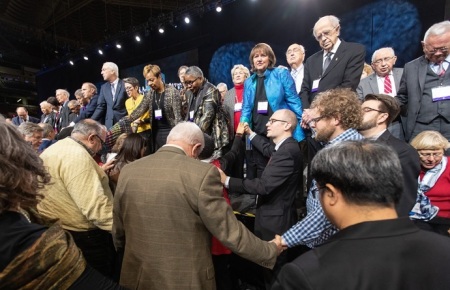8 UMC bishops say they can’t support denomination’s ‘current form of unity’ due to LGBT debate

Eight current and former bishops of the United Methodist Church have signed a statement supporting an end to the “current form of unity” for the denomination due to its yearslong debate on LGBT issues.
Titled “A Call to Deeper Conversations Regarding New Expressions of Methodist Witness,” the statement argues that the UMC should “be honest about our current reality.”
“The events transpiring since the adjournment of the Special Session of General Conference illustrate how deep our division is. Sadly, even greater discord, chaos and fighting loom on the horizon at the 2020 General Conference in Minneapolis,” read the statement.
“This is why we recognize our beloved United Methodist Church no longer can continue in our current form of unity. It is time to quit undermining our mission. It is time for the entire church to come together to figure out how to be the people called Methodists in a new way — to seek a new form of unity.”
The statement also expressed support for proposals given by both liberals and conservatives within the UMC that would, to varying degrees, split the mainline denomination.
“It is time to end our conflict that undermines all our efforts to proclaim the Gospel,” continued the statement. “It is time to bless, support and free one another to be the church we feel God calls us to be.”
Signatories listed on the bottom of the statement include retired bishops Lindsey Davis, Alfred Gwinn, Robert Hayes, and Young Jin Cho.
Active bishops who signed included: Scott Jones, resident bishop of the Texas Conference; Mike Lowery, resident bishop of the Central Texas Conference; Mark Webb of the Upper New York Conference; and Eduard Khegay, resident bishop of Moscow Area in the Northern Europe and Eurasia Central Conference.
Over the past several years, the UMC has had divisive debate over whether to keep its current stance, as laid out in the Book of Discipline, defining homosexuality as “incompatible with Christian teaching.”
This position includes a ban on the ordination of noncelibate homosexuals and a refusal to allow clergy to officiate same-sex marriages.
Although proposals to remove the language fail every four years at General Conference, opponents of the stance continue to increasingly resist the Book of Discipline rules on homosexuality.
In February, the UMC held a special session of General Conference aimed at passing a plan that would prevent schism over the debate.
Most bishops and many progressives supported a measure known as the “One Church Plan,” which would have largely allowed local bodies to determine their position on LGBT issues.
However, in a vote of 438-384, delegates instead approved “The Traditional Plan,” which upheld the UMC’s stance and put in stricter enforcement of the rules.
For the 2020 General Conference, delegates will entertain multiple proposals regarding the debate, including multiple measures aimed at splitting the denomination.
Last month, the conservative UMC advocacy group Wesleyan Covenant Association leadership officially endorsed the Indianapolis Plan for Amicable Separation.
The Rev. Jeff Greenway, chairman of the WCA Council, said in a statement last month that the council vote in favor of the Indianapolis Plan came after considerable debate.
“All the members of our council, both laity and clergy, have given years of service to The United Methodist Church; they have faithfully supported it with their talents, their time, and their service,” Greenway said.
“So it was obviously a very hard and painful decision to conclude some form of separation is the only viable way forward given the great impasse that threatens the denomination and its local churches.”





















